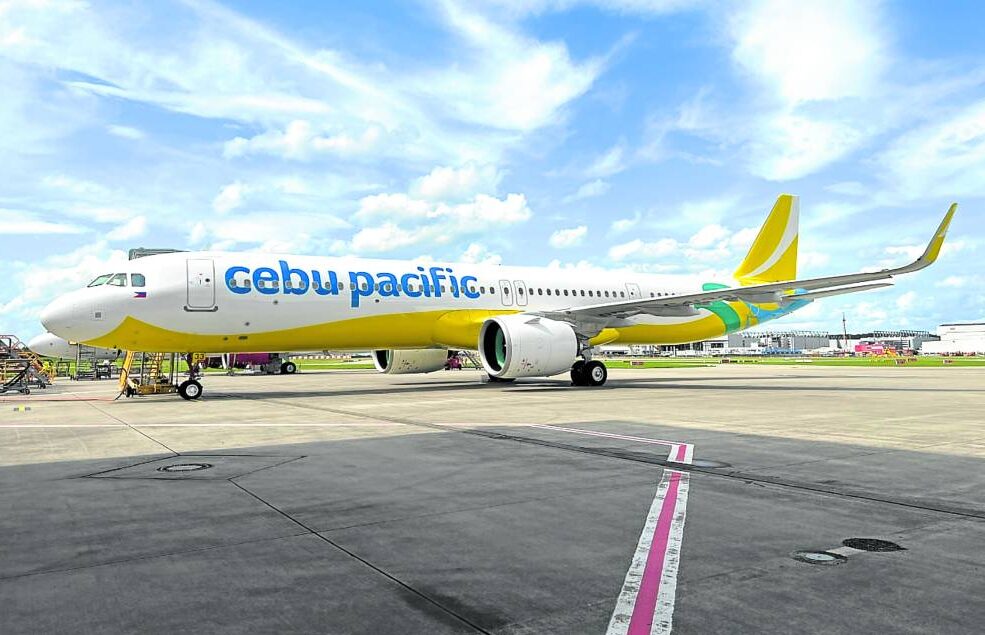Cebu Pacific makes its biggest bet ever . . . on the Philippines

$12-B REFLEETING A narrow-body or single-aisle plane operated by Cebu Pacific, which plans to add 100 to 150 such new aircraft to its fleet between 2027 and 2035. —CONTRIBUTED PHOTO
One would think that a company that has incurred losses of over P60 billion over the last three years of the pandemic would hunker down to lick its wounds, and tiptoe into the future with trepidation and caution.
But don’t tell that to the top brass of budget airline Cebu Pacific, which this week unveiled an aggressive expansion plan that will see it make the biggest aircraft order in the country’s history—100 to 150 narrow-body jetliners worth an estimated $12 billion at their current sticker prices.
By the end of this week, the Gokongwei family-controlled carrier will send out requests for proposals from European aviation giant Airbus and US-based Boeing Co. for each firm to put their best foot forward to win the mega deal.
The airline will make its decision by the first quarter of 2024 on which manufacturer will help it more than double its current fleet of 76 jetliners over the next decade.
It is a risky move coming off the challenging COVID-19 global health crisis that has ravaged airlines all over the world, but it is a risk that the company cannot afford not to take if it is to dominate the local and regional markets going forward, according to its CEO.
And Cebu Pacific’s British CEO Michael Szucs (pronounced “sooch”) knows something about taking risks and making big bets.
His father was a university student in Budapest taking up engineering in the 1950s. When the Soviet Union invaded Hungary in 1956 to quell the Hungarian Revolution, the elder Szucs fled to the United Kingdom, where he established a new life—a risky undertaking that was the first in a long series of events that led to his son being the head of the Philippines’ largest airline.
Almost seven decades later, it is the younger Szucs’ turn to make a big bet. And this time, he’s going “all in” on the Philippines.
Huge upside
Briefing the Inquirer’s business editors and reporters last Tuesday, the Cebu Pacific CEO and his executive committee laid down a compelling case for why the Philippines, with its young population and tremendous upside potential for travel, is worthy of a financial bet that is worth over 30 times the airline’s current market capitalization.
Discounting the steep economic contraction at the start of the pandemic, Szucs points out that the Philippines is expected to maintain its strong growth over the medium term, with a corresponding increase in the spending power of Filipinos.
More importantly, the country is expected to continue benefiting from the so-called “demographic dividend” for decades ahead, courtesy of its young population, which will grow the workforce and boost consumption and economic activity.
Add to this the country’s geographic luck of being situated at the center of the Asia-Pacific region, where it is only four hours’ flying time from all the major North, East and Southeast Asian tourists and metropolitan centers.
“There are two billion people within a four-hour flight of the Philippines and we are the nearest tropical destination from North and East Asian countries,” Szucs says, explaining that Manila is a short flight from 25 of the 40 most populous metropolitan areas in Asia.
As they stand, the opportunities for Cebu Pacific are substantial. The airline CEO notes that, before the pandemic, Filipinos only took, on the average, 0.6 air trips per capita—a very low number for an archipelagic country of over 7,100 islands.
In contrast, similarly sized economies like Thailand had 1.8 air trips per capita during the same period, thrice the level of the Philippines. Meanwhile, Malaysians took 2.5 air trips per capita on the average, over four times that of Filipinos.
Szucs believes these gaps are potential upsides that Cebu Pacific should be capitalizing on, by helping the local market grow.
At the same time, the tourism industry is expected to recover strongly over the next few years and, thus, drive demand for travel, both locally and internationally.
Landmark deal
Szucs is also encouraged by the progress the country is making in improving its aviation infrastructure, chief of which is the P740-billion New Manila International Airport, which the country’s largest conglomerate, San Miguel Corp., is building in Bulacan. Cebu Pacific is hoping to build an operations hub at this airport just 15 minutes north of Manila as part of its growth strategy.
“Whether that opens in 2026 or 2028 is great for us,” he says, adding that interim plans to rehabilitate the Ninoy Aquino International Airport is also a positive factor for the airline.
All these elements are providing Cebu Pacific and its shareholders the impetus to grow their company, aircraft fleet and manpower to meet what they expect will be a surge in travel demand over the next few years.
“Because of that, we’ve got the confidence to put our money where our mouth is,” he says. “Hence, we’re looking to make a large order over the long term.”
Does it bother him that the company is making such a big bet just as it comes off three straight years of pandemic-related losses? Not at all, he says.
In fact, it gives Szucs greater confidence to take the plunge, knowing how the airline honored all its commitments to its business partners and suppliers during the bleakest days of the COVID-19 crisis, with the full support of its key shareholders.
“We had some very tough discussions with our suppliers, that’s for sure,” he says, when asked about how Cebu Pacific handled the travel slump in 2020 and 2021. “But at the end of the day, every single obligation was paid, and we didn’t default on anything.”
This reputation of honoring all its deals even during the direst of financial times, he says, is what makes Cebu Pacific a preferred business partner in the aviation industry today.
“And Boeing and Airbus know that,” he adds. Which is why he expects both aviation giants to be putting in their best offers for what will be the biggest aviation deal in Philippine history.

